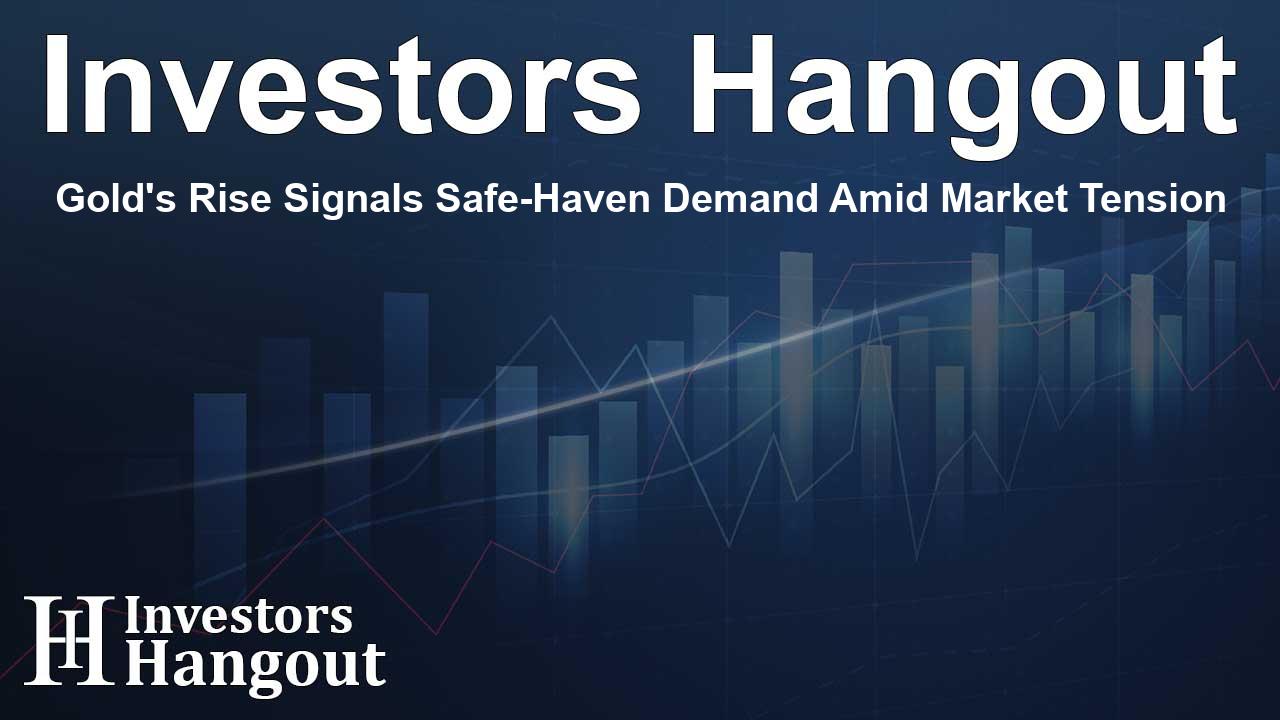Gold's Rise Signals Safe-Haven Demand Amid Market Tension

Gold's Significant Surge
Gold gained substantial momentum, appreciating by 1.34% as demand for safe-haven assets rose amidst market uncertainties. Investors are increasingly concerned about potential trade tariffs that may stem from the U.S. administration.
The rise in gold prices has sparked interest among investors, particularly as it broke the notable threshold at $2,720, achieving a two-month peak. Many are now considering gold as a refuge against possible negative economic impacts resulting from new trade restrictions.
"The current movement in gold prices is primarily driven by the anticipated threats of blanket tariffs. Information regarding possible tariffs has been emerging steadily," remarked a commodity strategist, highlighting the market's sensitivity.
Recently, indications from the U.S. administration suggest that they may consider introducing import duties on goods, which has heightened investor anxiety. Historical context indicates that gold prices experienced a notable increase during previous tariff discussions, particularly in 2017 when they rose by 13%, marking a significant annual performance.
The trading environment has remained active, especially during Asian and early European sessions, although the economic calendar appears quiet today. Nevertheless, speeches from several central banking officials at notable events could introduce volatility in the market, potentially impacting gold prices as investors react to their insights on monetary policies and forecasts regarding global economic conditions.
"Spot gold may fluctuate between $2,719 and $2,728 per ounce, based on the observed wave patterns and market conditions," mentioned a Reuters analyst, suggesting caution among traders.
The Euro Experiences Vulnerability
Conversely, the euro displayed momentary resilience, gaining 0.14% against the U.S. dollar amid the ongoing discussions related to possible U.S. tariffs. The markets have been reacting to uncertainty about how these trade policies may impact the broader economic climate.
"Volatility has returned significantly, especially following a prolonged period of calm. The FX markets are particularly sensitive to any tariff discussions from the current administration," noted an FX trader.
Gradual changes in trade policies are on the horizon, and while tariffs could extend to various goods, the U.S. has communicated a measured approach. As the eurozone remains a vital trade partner to the U.S., any shifts in trade relationships could have profound implications for euro valuation and economic growth.
"The crowded positions in long dollar trades show that any ambiguity concerning tariffs could prompt significant market movements," another market expert elaborated.
As per the latest reports, the euro remains significantly oversold among major currencies, suggesting a potential rebound in the near future. Traders are closely monitoring market dynamics, especially as the European Central Bank's president prepares to speak at an influential forum, which could also affect EUR/USD trading behavior.
Australian Dollar Faces Headwinds
The Australian dollar has encountered bearish pressures, losing 0.05% against the U.S. dollar during a notably volatile trading session. Initial declines were seen, but the currency managed to recover some ground as the day progressed.
The uncertainties surrounding U.S. trade tariffs have also placed pressure on the Australian dollar, leading investors to speculate about its value in light of potential broader market impacts. Although there have been no direct mentions of Australian goods facing tariffs, any new trade policies could still indirectly influence AUD/USD outcomes.
Moreover, divergences in monetary policy outlooks between the Reserve Bank of Australia and the U.S. Federal Reserve have further complicated the Australian currency's stability. Lower underlying inflation in Australia has raised expectations of potential rate cuts, amplifying challenges for AUD holders anticipating market reactions.
AUD/USD trading has reflected this discord amid expectations for central bank commentary during the economic forum. As traders remain on alert, any unexpected insights could spark volatility, particularly affecting Australia’s risk-sensitive currency.
Frequently Asked Questions
What is driving gold's recent price increase?
The increase in gold prices is primarily attributed to heightened safe-haven demand amid uncertainty about potential trade tariffs and overall economic conditions.
How do trade tariffs affect currency values?
Trade tariffs can create volatility in currency markets, impacting investor confidence and altering expected economic growth, which in turn affects currency values.
Why is the euro currently considered oversold?
The euro is seen as oversold due to large short positions held against it, suggesting a potential for a price rebound as these positions may be unwound.
What challenges is the Australian dollar facing?
The Australian dollar is facing challenges from potential U.S. tariffs and differing monetary policy expectations between the Reserve Bank of Australia and the Federal Reserve.
How can central bank speeches impact currency trading?
Speeches from central bank officials can provide insights into future monetary policies, influencing traders' perceptions and market reactions, causing fluctuations in currency values.
About The Author
Contact Ryan Hughes privately here. Or send an email with ATTN: Ryan Hughes as the subject to contact@investorshangout.com.
About Investors Hangout
Investors Hangout is a leading online stock forum for financial discussion and learning, offering a wide range of free tools and resources. It draws in traders of all levels, who exchange market knowledge, investigate trading tactics, and keep an eye on industry developments in real time. Featuring financial articles, stock message boards, quotes, charts, company profiles, and live news updates. Through cooperative learning and a wealth of informational resources, it helps users from novices creating their first portfolios to experts honing their techniques. Join Investors Hangout today: https://investorshangout.com/
The content of this article is based on factual, publicly available information and does not represent legal, financial, or investment advice. Investors Hangout does not offer financial advice, and the author is not a licensed financial advisor. Consult a qualified advisor before making any financial or investment decisions based on this article. This article should not be considered advice to purchase, sell, or hold any securities or other investments. If any of the material provided here is inaccurate, please contact us for corrections.
